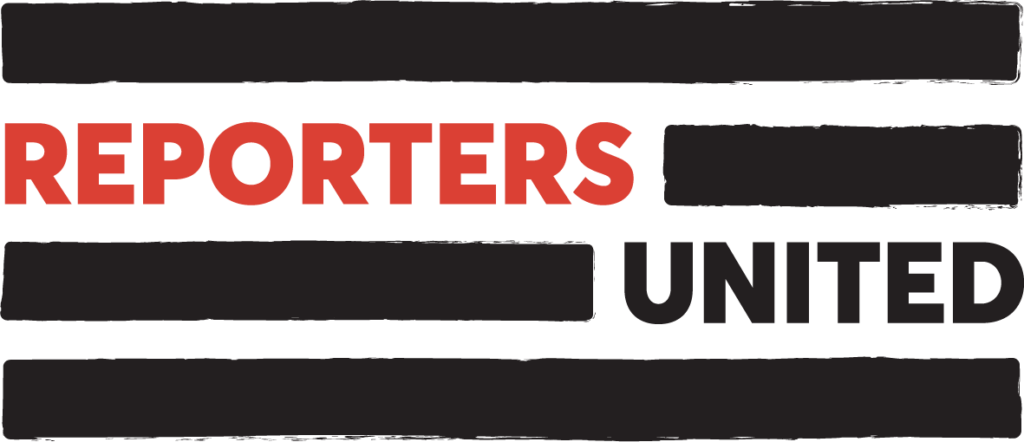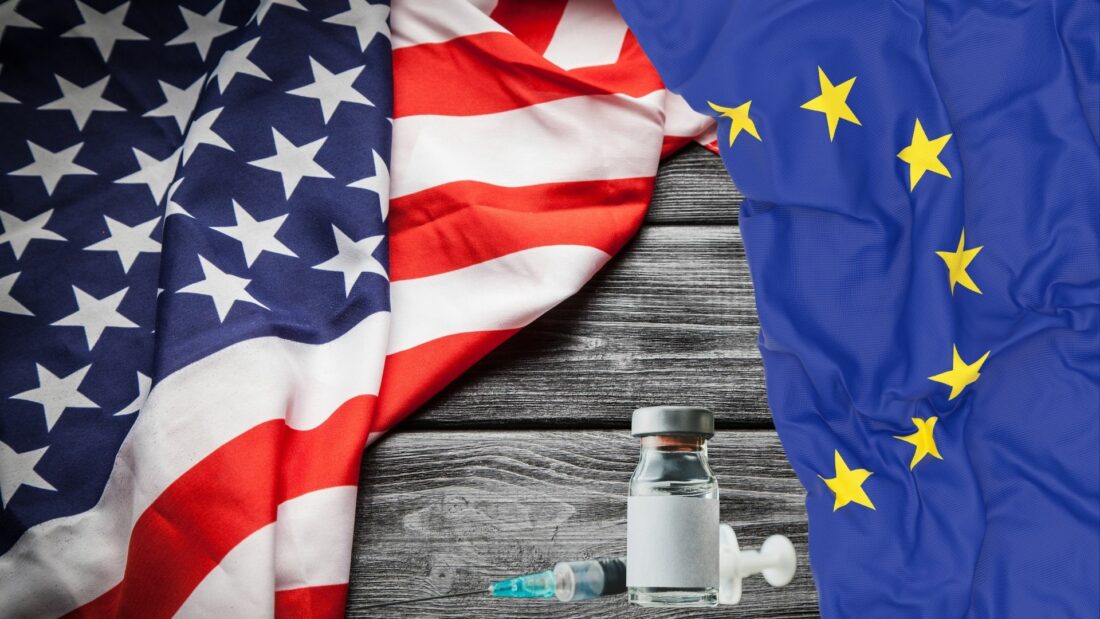The EU is “ready to discuss any proposal that addresses the crisis in an effective and pragmatic way”. That is why “we are ready to discuss how the US proposal for a waiver of intellectual property protection for Covid-19 vaccines could help to achieve this goal”, Ursula von der Leyen promised on Thursday.
Overnight, the president of the EU Commission had changed the script that she has been using for the past seven months. Until very recently, she was unopposed by European governments. All that changed after the US government had shaken the financial markets, the pharma industry, global health advocates and political allies with its announcement Wednesday evening that the US is throwing its weight behind a demand by over 100 countries in the Global South to release patents on Covid-19 vaccines. The move is intended to free any spare production capacity globally.

“I am not at all a friend of releasing patents,” von der Leyen told the New York Times in late April. That was fully in line with what the EU Commission has said ever since South Africa and India tabled a proposal to lift patents for Covid products during the pandemic: That nothing indicates that patents are a real barrier to accessing treatment against corona. On the contrary, the Commission maintained that the intellectual property system is a part of the solution.
This is very much also the view of the pharmaceutical industry, whose lobbyists have had many meetings in the past six months with the five EU commissioners who have vaccines and medicines in their policy portfolios. The watchdog NGO Corporate Europe Observatory has registered meetings that could relate to the current state of production and distribution of vaccines and medicines since October last year. The pattern they see, is this: the door is open mostly to pharmaceutical companies and their lobby groups, and to those that helped develop the global voluntary vaccine sharing setup, Covax, a historic initiave verbally supported by Western states, but which has been dramatically underfunded and does not seem able to deliver vaccines to 20% of the populations of 92 low- and middle-income countries, as it hoped to do.
The European line has additionally been to point out that the EU is the world’s leading vaccine exporter, and to call on others — especially the US, who also produces but hasn’t exported any vaccines — to do the same thing. On Thursday, after von der Leyen expressed support for discussing the waiver, she also stressed this point. “In the short term, however, we call on all vaccine producing countries to allow exports and to avoid measures that disrupt supply chains,” she said. “So far, more than 200 million doses of vaccines produced in Europe have been shipped to the rest of the world. Europe exports almost as much vaccine as it supplies to its own citizens. To be clear, Europe is the only democratic region in the world that exports vaccines on a large scale”.

The European Commission represents all EU member states in the World Trade Organization, WTO, where the seven-month-old proposal has been treated by Western governments as if it were toxic. Until April 21, there was no visible crack in the EU’s united front against changing trade rules for a temporary period.
“Only communication challenges remain”
Investigate Europe has seen the German government’s minutes of meetings of the trade policy committee at the Council of the EU in January and February 2021. This is where the representatives of the member states coordinate the EU trade policy actions. At three meetings of the committee during this period, a Commission representative reported how EU officials at the WTO defended the EU’s opposition to the waiver. They received nothing but encouragement from the national governments.
Some of them were only concerned with the criticism from experts and aid groups, like Doctors Without Borders (MSF). The minutes of January 11 state: “Denmark agrees with the Commission’s line on TRIPS, but pointed out that the dossier must be communicated constructively to civil society (as did France, Italy, Sweden and Germany)”. The same happened at the February 12 meeting. Once again, the Commission representative’s report on the rejection of the TRIPS waiver went unchallenged. Only the Dutch government commented on it, saying there was “no need for a substantial change of position, but communication challenges remain”.
A Spanish dissident
The Spanish government was the first to break ranks. Eliminating patents on vaccines is becoming especially relevant, said Pedro Sánchez in a speech to his Latin American colleagues at the Ibero-American summit in Andorra on April 21. Many of them are facing an even more disastrous Covid situation than Spain, with much fewer vaccines. Many support a patent waiver.
“Intellectual property rights must help and not be a brake in the fight against COVID-19,” Sanchez said. “And in this sense, Spain is willing to promote this discussion, especially among our European partners, also within the framework of the World Trade Organization, to analyse the options that allow us to advance in the most effective and equitable way possible in the fight against Covid-19.” He added that Spain is working on a proposal to share with the EU member states and within the WTO.
Questionnaire to all
Following this, Investigate Europe contacted all EU governments plus the UK, Switzerland and Norway, asking for their positions on the patent waiver proposal. Sixteen of them, including Spain, responded to us before the US Trade representative Katherine Tai posted the Tweet that had many in the global health community break out in cheers. The same tweet also saw the shares of vaccine owners, Pfizer, Biontech, Novavax, and Moderna, plunge.
Nearly all the European governments that responded to IE’s questions, filed up behind the EU Commission, rejecting the waiver. A few answered on May 5, just hours before the American reversal of its previously staunch opposition. One government, on background conditions, stated that “so far we have not seen any clear indication that the US government intends to support the exemption. We, therefore, consider it premature to consider this issue.”
As many of these positions might change in the coming days – and more EU and government officials now might aim to present themselves as supporters of what is suddenly called the “US proposal” – Investigate Europe think it is important to document the positions as they were sent to us:
Austria (May 3)
At present, the supporters of a TRIPS waiver have not yet provided any compelling arguments as to how the situation would be improved by releasing IP protection, according to the Austrian government.
“Unregulated technology transfer would in all likelihood create chaotic situations, as complex production processes need to be supported by skilled workers and monitored by quality assurance processes. The protection of intellectual property is therefore not the problem, but the basis for long-term solutions. Already at present, there are very specific liability issues related to vaccines and marketing authorisations, which would be far more serious if produced without sufficient “vaccine”-specific expertise and used in an uncontrolled manner, not to mention the real danger of counterfeit (fake) vaccines.”
Denmark (May 4)
The Danish government believes that the TRIPS agreement provides WTO members with sufficient flexibility on vaccines, and thinks the proponents of patent exemption so far have failed to demonstrate that lifting patent protection would lead to increased vaccine production worldwide.
Estonia (May 5)
“We believe that the current problems with access to vaccines are mainly related to the lack of sufficient manufacturing capacity and not to the IP protection of COVID-19 related vaccines and therapies (…) The waiver is not the right solution and will not help us and may even hinder us from achieving the goal of equitable access to COVID-19 therapies and vaccines.
The Government of Estonia believes that the main mechanism for achieving equitable access to is Covax”, the statement said. *
*Covax is the initiative of the World Health Organization, the vaccine alliance GAVI, and the vaccine coalition CEPI, to secure vaccines for 92 countries that can’t afford to buy them on the market. It aims to vaccinate 20% of the populations of these countries in 2021 but is dramatically under-financed.
Finland (May 1)
The waiver question is very complex, and no real evidence has so far been presented by the proponents of patents being the obstacle preventing the scale-up, according to the Finnish government.
“Voluntary cooperation to scale upproduction via e.g. licensing should be the first option and those flexibilities the second one. The waiver does not bring additional benefits. On the contrary, it creates uncertainty and may even hamper the much-needed cooperation between various actors.”
But the government keeps the door open: “If it were to turn out that the TRIPS obligations actually hindered increased production or distribution of vaccines, we would of course demand that they be corrected.”
Germany (April 30)
Germany supports the Commission’s sceptical attitude towards the waiver proposal; it has not yet been sufficiently substantiated. Voluntary approaches and cooperation, and in particular, multilateral approaches, will lead to an increase in global production capacity, which will ensure the supply of vaccines to the entire world population, according to the government.
“Simply suspending the TRIPS Agreement would not create additional production capacity. On the contrary, it would be feared that the willingness of the pharmaceutical industry to transfer know-how and to support the expansion of production capacities in developing countries would decrease, as would the willingness to develop adapted vaccines against new mutations”.
Hungary (May 5)
“Hungary supports the position of the European Commission and underlines that strong Intellectual Property protection should be maintained. In our view, the TRIPS Agreement provides the necessary flexibilities to tackle even a worldwide pandemic, while waiving IP Rights is not a sufficient instrument to expand vaccine production,” the government states.
Ireland (May 5)
The Irish government points out that it is represented in the TRIPS discussions by the EU Commission, and supports its line:, adding “that the challenges raised by the proponents of the TRIPS Agreement waiver can be addressed through the existing flexibilities within the WTO TRIPS Agreement which allows governments to grant compulsory licences without the permission of the patent holder.”
Ireland also supports the EU Commission’s view that the Covax Facility ”is the mechanism that is best placed to ensure that high-income countries finance the vaccines and support the developing countries to secure their share of global supply.”
Latvia (May 3)
Latvia is also represented by the EU Commission’s position and thinks that “the TRIPS exemption alone seems insufficient to ensure equitable access to vaccines”.
However, the government states that it does not have a definitive position on the India/South Africa TRIPS waiver proposal and supports further discussions. “Latvia believes that priority should be given to increase the vaccine production and availability. This is not exclusively a question of intellectual property, but concerns also aspects such as supply chains, cooperation between governments and producers, transfer of know-how, etc. Here it is worth to note that Latvian pharmacy producers have already expressed readiness to join the supply chains of vaccine production.”
Lithuania (April 30)
Lithuania aligns with the EU27 position on lifting patents, according to the government.
The Netherlands (May 4)
The Netherlands is not convinced that the waiver proposed by India and South Africa would help to boost production. “We have as of yet not received solid examples where IP rights are a bottleneck to such an increase.* Moreover, if IP rights would become a barrier, the TRIPS Agreement already provides flexibilities for IP rights, such as the possibility of compulsory licensing in case voluntary cooperation would fail.”
“In addition, the waiver could disrupt voluntary collaboration and the transfer of know-how, which is a key requirement for increasing manufacturing capacity”.
*Proponents of the waiver have presented several papers with examples of IP rights being barriers to access.
Norway (May 5)
Norway does not support the original proposal of India and South Africa, according to the Norwegian government, which has also held the chair of the TRIPS council since March. The government sees the proposal as too far-reaching, both geographically and in the many products it covers. It may even work against the proposal’s purpose by weakening incentives to develop drugs and medical equipment, according to the government. It has requested South Africa and India to submit a narrower proposal.
The most efficient way to increase production in the short term is through cooperation between producers and voluntary schemes. It is important that the pharmaceutical industry “does its utmost to contribute to this”. However, if South Africa, India and the countries that are most strongly opposed to the waiver should be able to find a solution, Norway will support this, said the government.
Portugal (May 3)
The Portuguese government supported the EU line in a statement to IE before the US about-turn. The WTO TRIPS agreement already allows the necessary flexibility, such as the possibility of compulsory licensing. In this sense, the response to a request for derogation could, from a European perspective, act as a disincentive to innovation and health research, the government stated.
Sweden (May 5)
What is most needed now, beyond developing vaccines, is the ramping up of manufacturing of vaccines. The Swedish government states that the best way of achieving that, is “disseminating the technology and know-how of those who developed the vaccines through licensing arrangements. Intellectual property is a key factor in providing a framework that enables these arrangements.”
Sweden continues “to have questions on the rationale and the potential benefit of the waiver”. The government refers to so–called flexibilities in theTRIPS agreement that allow governments to get fast-track production licences where no negotiations with the patent holder are required, for export to countries with no or insufficient manufacturing capacity.*
*This process is complex and has only been used once.
Switzerland (May 5)
The Swiss government rejects the South African/Indian waiver proposal.
Patent protection ensures that the necessary private investment in research and development is made in addition to state funding. Suspension of the TRIPS agreement would not be conducive to achieving universal access to vaccines, according to the government. “Suspending the TRIPS agreement would invalidate WTO rules that have been in place for over 25 years and have been accepted by 164 countries.” Rather, “proven international rules are an important basis for overcoming the crisis”.
UK (April 28)
The government does not support the waiver proposal. “We are committed to exploring ways in which we can improve equitable access further and believe this should be done through the existing Intellectual Property framework,” according to a statement by a spokesperson who adds that the UK is one of the biggest donors to Covax to ensure global access to vaccines. It continues “to encourage manufacturers to provide their vaccines on a not-for-profit, transparent basis during the pandemic.”
Poland
The Polish government did not respond to Investigate Europe’s questions about its policy on patents for Covid-19 products. According to Doctors Without Borders (MSF), however, Poland is among those opposing the proposal to temporarily lift patent protection in the TRIPS council.
Instead, Polish Prime Minister Mateusz Morawiecki called for voluntary patent sharing at a teleconference summit of the EU in February. He suggested “that pharmaceutical companies that have developed vaccines by using a lot of public money — including European taxpayers’ money— should share patents with other companies that have available production lines and can quickly start making vaccines.” The health and lives of citizens are too important to be sacrificed for the better financial result of a few companies, Morawiecki stressed.
This is the official line on the international stage, but at the same time in Poland, the government has not made any moves in this direction, nor is there any public debate on the release of patent rights.
Slovakia and the Czech Republic
Neither the Czech nor theSlovak governments responded to Investigate Europe’s questions about their policy on a patent waiver.
Like Poland, theyhave not officially addressed patent rights. In both countries, public opinion is fired up by other issues; in the Czech Republic, there is an ongoing dispute over the activities of Russian spies.In Slovakia, the confusion over importing the vaccine from Russia has led to resignations in the government. At the same time, pressure is mounting in both countries to look for vaccines in Russia and perhaps also in China.
Greece
Neither Greece, Cyprus nor Bulgaria have responded to IE’s questions, which were sent just before their Easter. After the US patent waiver bombshell, however, the Greek minister of state said this:
“The prime minister raised the issue of patent waiver in his interview with Frankfurter Allgemeine Zeitung in April 2020. His proposal was to waive the patents for the Covid-19 vaccines». In fact, Mitsotakis proposed a different idea, one equally outside of the box: that EU states jointly buy the patents and then distribute them.
But on January 15, 2021, during a debate with the leader of the opposition in the parliament, the Greek PM dismissed the idea of a patent waiver as “untenable”. He added in a mocking tone: “At least, you didn’t ask for the nationalisation of Pfizer and Astra Zeneca”. According to Mr Mitsotakis, such arguments “show a serious ignorance of the norm in the international research and business environment, or an inexplicable naiveté, and an appetite to misinform the public opinion”.
The 180 degree–turnaround
Wednesday’s announcement from the Biden administration offers support for a waiver that is much narrower than the scope of the original Indian-South African proposal. The latter named all products against Covid-19. The Americans only go as far as lifting patents on vaccines. Nevertheless, the announcement is seen as a game changergamechanger.
Last year, the Trump administration led the opposition to the waiver when the proposal was tabled in October. Since Joe Biden took over the presidency, he has been under growing pressure to take on global leadership at the WTO in a way that can remove the production bottlenecks and secure a global victory over the virus.
A recent poll by the US organizations, Data for Progress and the Progressive International, found that 60% of American voters want President Biden to join the 100 plus lower- and middle-income countries in their demand to temporarily waive patent protections on Covid-19 vaccines at the WTO.

Ten Democratic senators, among them Bernie Sanders and Elizabeth Warren, have been urging Biden to support the waiver, arguing it will help everyone, including the US. Congress has channelled billions to rescue travel, tourism and hospitality industries during the pandemic, they note. “These industries will remain in crisis and reliant on billions more in government help until the pandemic eases. The faster we can bring this emergency to an end, the faster these industries can recover. The TRIPS waiver is key to the end of the pandemic and strong American recovery,” the senators state.
Covid-19 victims’ bodies are burning in India as numbers in the country escalate to alarming rates, demonstrating that the pandemic is not at all under control. This may have strengthened the argument that it is in the self-interest of the US to support the waiver, and helps explain the 180-degree American turnaround. “One reason why Biden will back a waiver on vaccines but not therapeutics or diagnostics, is that vaccines in foreign markets protect us. Therapeutics, diagnostics in foreign markets, don’t,” Tweeted James Love, director of the NGO, Knowledge Ecology International.
Will Europe follow?
The German government does not share in the suddenly widespread waiver enthusiasm. ”The protection of intellectual property is a source of innovation and must remain so,” said a spokeswoman on Thursday. The French government has not responded to Investigate Europe’s questions. And while France officially embraced the waiver on Thursday after having been opposed before, Junior Europe Minister Clément Beaune expressed, likely on behalf of many EU colleagues, the feeling that the US is making Europe look less progressive than itself, with little reason. He told Politico that it was a “very political move because so far they have exported nothing” in terms of vaccines.

Today, Friday, may reveal just how powerful and convincing the new American leadership comes across in European capitals. Twenty-seven EU governments kick off an EU summit in Porto, Portugal, in a long-planned physical meeting about wages, childcare and gender equality. But in the margins of the “social summit”, the patent waiver is demanding attention.

“Following statements by the Biden administration, the topic of the international dimension of the Covid vaccine will now be discussed at the summit. This will take place during the heads of government dinner Friday,” an EU Council official told Investigate Europe.
“The EU position has not yet changed,” he added.





